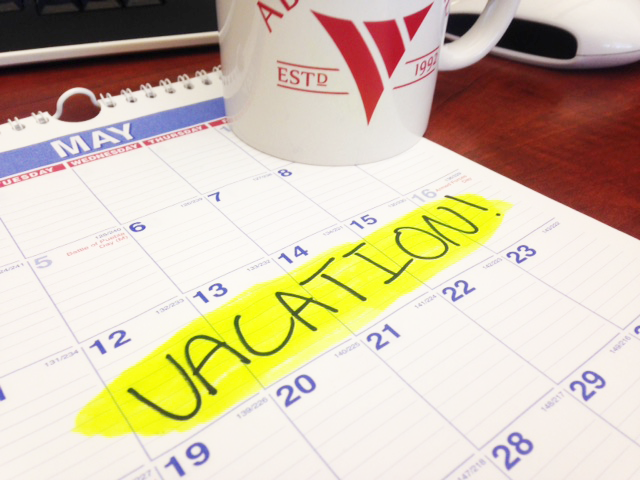 Many companies offer their employees PTO (Paid Time Off) instead of a set number of vacation days and sick days. It simplifies things for employers because when you lump sick days, vacation days and personal days all into one bank, it makes it less likely that staff members will take a day off for a case of the sniffles.
Many companies offer their employees PTO (Paid Time Off) instead of a set number of vacation days and sick days. It simplifies things for employers because when you lump sick days, vacation days and personal days all into one bank, it makes it less likely that staff members will take a day off for a case of the sniffles.
It also makes it easier for employees because putting all of your time off into one category keeps you from wondering how to count time off for religious holidays, your kid’s out-of-town hockey tournament or your annual family vacation to the beach. Also, if the Fourth of July falls on a Thursday, it makes taking off on the 5th suddenly much simpler!
Let’s face it, your employer WANTS you to take your PTO. Smart companies know that if you are really sick, you need to stay home instead of coming in to the office and spreading your germs. They also know that the occasional day off and that yearly beach vacation are much-needed refreshers if they want a staff of happy and relaxed individuals.
With a little planning, rationing out your bank of PTO days should leave plenty of time to take care of your needs. But we ALL know That Guy who just can’t resist the temptation to stay home and get paid for it. He burns all of his PTO in January and February then suffers through the rest of the year with no time off. Or worse, he is forced to take unpaid days when actual emergencies arise.
Burning through your PTO? It’s time to reconsider.
We turned to our Facebook friends for some real life scenarios that might help you avoid being That Guy this year.
Michelle: “My dad used up all of his PTO last February. Then he had to unexpectedly move which required him to pack up all of his belongings, house hunt, and move in to his new home, all without any time off. He also ended up in the hospital and had to go without pay during that time.”
Nicole: “My crazy grandmother decided to book a family vacation on her dime at the last minute and I couldn’t go because I had used up all of my time off. Everyone else was lounging in the Caribbean in an all-inclusive and I was stuck at home.”
Allison: “My healthy coworker, who just graduated college, had a collapsed lung last year and ended up in the hospital not once, but twice.”
Cara: “I save my days in case my kids have unexpected illnesses, doctor appointments and random viruses that pop up. We take a yearly family vacation, but I always make sure to save a few days in case I just need a break, like if I’m feeling burned out and need a long weekend to disconnect.”
Mike: “Think about it from the company’s point of view. Spreading out your time off helps them out, too, so they don’t have to function without you while you’re burning up your PTO January and February. Plus, it will lower the morale of your coworkers who have to pick up the slack while you’re gone.”
Anna: “You know, if you take all of your time off at once, it could reflect poorly on you when review time rolls around. Taking it all at once makes it difficult on your coworkers and can affect project deadlines. Plus, if you end up leaving your job halfway through the year, you could end up having to pay back those days that you used but haven’t accrued yet.”
Chelsea: “My husband is using all of his PTO in April when I have the baby and I’m worried he’s going to regret that later on in case he needs it for something else.”
Brianne: “Burning through it would be a lot like not having health insurance or a rainy day emergency fund!”
Just some food for thought if you’ve been a little free with your PTO spending in the last couple of months. Don’t forget that nice weather is coming and you might want to take a day here or there to enjoy it!
If you have a story about time off that you’d like to share, please leave a comment!
Tweet










